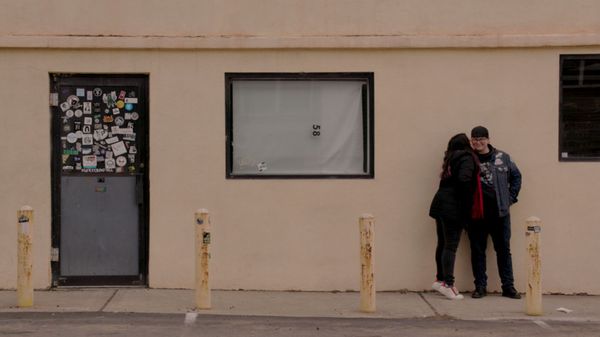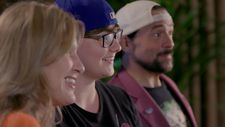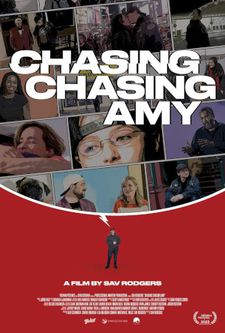 |
| Chasing Chasing Amy |
Kevin Smith’s Chasing Amy is a film with a complex legacy. Made by a well-intentioned straight man at a time when wider social attitudes to LGBTQ+ people were entering a period of rapid change, it has meant very different things to different generations. For Sav Rodgers, who discovered it in childhood when he was only just coming to terms with his attraction to women and before he had the context to identify himself as trans, it was a lifeline, promising another world beyond the small town prejudice he encountered day to day. It was a film he watched “at least” daily, and which he loved so much that he gave a TED Talk on it. Then Kevin saw the talk, and a connection was made, and a new film, Chasing Chasing Amy, took root.
One of the biggest success stories of the queer festival circuit over the past year, Sav’s documentary has screened all around the world, from OutFest LA to BFI Flare, and has also been picked up by mainstream festivals like London. I was delighted to get the opportunity to talk to him about it, and began by asking about the thing that led him to Kevin’s film in the first place: his childhood obsession with Ben Affleck.
“When I was a kid, my mom took me to see Daredevil in theatres,” he explains. “I think she knew I had an interest in superhero stuff. I was a geeky little kid, and upon seeing Daredevil, I was like, ‘Wow, this guy's amazing!’ You know, in way that children think movie stars are amazing. And so I started watching a lot of his filmography from there. I tried to watch everything from Good Will Hunting to Changing Lanes, everything that was available at the time, and Chasing Amy was towards the tail end of what was available that I was allowed to watch at the time. It was something that my mom just happened to have on DVD.
“I think I was identifying with a multitude of characters in the film. I did identify with the comic book writers who got to make interesting work for a living. I was attracted to the sense of humor that everybody had. I was attracted to these big romantic feelings that Holden had because I was a kid who desperately wanted that kind of love, long before I would ever find it. And I just really appreciated how honest and lived in those characters felt, even if I didn't have the language for it. I was responding to something that felt really honest.”
When did he make contact with other LGBTQ+ people and realise that it wasn't universally loved within the community?
“I wouldn't realise that until film studies college, but also going to LGBTQ studies classes, women's studies classes. It wasn't until I was having this conversation in that crowd that I realised, ‘Oh, maybe this movie isn't as loved as I previously thought.’ I previously thought that nobody had heard of this movie because nobody around me had heard of it. And I realised, well, that's not true. I started having these conversations and that dissonance between what I felt and what they felt and how they responded to it, I thought was a really interesting conflict that I was interested in exploring.”
We talk about the differences between our first encounters with the film. I explain that from my perspective, when it first came out, there were very few films around at all that touched on any kind of queer life, particularly for women, and a lot of men still seriously believed that any woman who showed an interest in other women could be converted. That was a really problematic environment for the film. Now, however, a lot has changed socially, in turn changing the way that it's perceived and affects people.
 |
| Chasing Amy |
He nods. “I mean, not that biphobia doesn't still exist, but we try to contextualise that in Chasing Chasing Amy: what other media of the time was saying about the idea of bisexuality, fluidity, whatever you want to call it. That scene in Sex And The City that came out maybe a decade after Chasing Amy. There was this idea that you were either gay or you were straight. There was very much biphobia. But also, like you mentioned, there was that context of ‘Well, it's just a phase,’ even for a woman who calls herself a lesbian.
“Watching it when I was growing up felt like a very different experience because I didn't have that context of homophobia, biphobia, other than what I had experienced, and what it felt like in my world was that being queer was dangerous, and being queer put a target on your back. And then I had a film to watch where that wasn't the case, actually. Other than Banky, everybody was pretty cool. By the end, it seems like even Banky has learned a lesson in, at least from my perspective. And that was powerful. And then learning about that context later, well, I still had this affection for it. I think that just goes to show that we all have these very subjective experiences as moviegoers, and films touch us in different ways.
“I totally respect anybody who feels hurt by Chasing Amy. That's a completely valid read on the movie. And also, it's a movie that saved my life and provided comfort when I most needed it as a closeted kid.”
Kevin obviously understands now that people don't universally love it. Has his own way of looking at it changed over time?
“Well, I can't speak for Kevin or anything like that, but there is a clip that we use in Chasing Chasing Amy that's from an interview at South by Southwest 1997 when they were doing an MTV story on the film, and he mentioned the critiques that he was getting, even immediately as the film came out. The idea that it's a male fantasy, the idea that it's not authentic. When the team was searching through the archive, I was surprised to find him come to that conclusion so quickly after the film had been seen at Sundance and South by Southwest, even just those two film festivals.
“I think it would be impossible to think that over the course of 25 years, your perception of a thing you made hasn't changed. I mean, life changes us, and the world has changed a lot since 1996, when he made it, especially how popular the internet has become and how anybody can share an opinion on anything and immediately find you, whether you like it or not, if you have some sort of public social media account.
“What I appreciated about Kevin a lot during the making of the film was that he was not defensive whatsoever about any question and, assessing what is effectively his legacy with this film. That was a really refreshing thing, honestly, to be able to just ask questions about the hard stuff and to get what felt like really sincere answers.”
He has a reputation for being a very open person, I note. But it is a very personal film for him as well. How did Sav get the balance right, avoid being too intrusive and yet still find room to explore that aspect of the story?
“It's a terrific question because that was a balance that we had to strike the entire time. I think the fact that I had put my own personal story out there through the TED Talk helped contextualise it for everybody. ‘Look, I'm putting myself out here, too. I'm not just poking around asking questions for no reason. This has a personal element for me, and I'm also deeply curious about this history.’ And, you know, nobody had to say yes. ‘If you don't want to participate, that's fine. It would mean a lot to me if you were able to participate.’ And some people turned us down and others were like, ‘Okay, that's totally fine.’
 |
| Chasing Chasing Amy |
“The understanding of how personal it was to everybody who we interviewed wasn't apparent until were doing the interviews. For me, even with all my years of research, the idea that this was as personal as it got for Kevin and company, that was intense. But I do think that me putting myself out there and being just as vulnerable with them, it helped lay a foundation of trust, or at least I hope it did.”
It was very difficult back then for a straight actor to play an LGBTQ character, because people were worried that it would affect their careers. Was that something that came across in interviews?
“I had asked Joey about that,” he says. “I'm paraphrasing here, but she said ‘It's inspired by my life, so I felt like I had a right to play the character,’ which is fair. I love that for actors it's an empathetic experience more than anything. So, you know, what Joey says in our film is totally right on. It's not a haircut. It's not a jacket. It's a person, and you just play it that way. Joey did a beautiful job playing Alyssa, and that performance still stands up. It's still an amazing piece of work.”
It’s a personal story for Sav too, and for the woman in his life, as events in their lives become entangled with the exploration of Kevin’s film.
“In terms of Riley and I sharing our personal stories, for me, it was totally unexpected because from the outset of the project, I was not interested in inserting myself,” he says. “My thought was always ‘I can leverage my personal connection to Chasing Amy to get people interested and to get people wanting to be involved.’ I could say and truthfully that I have this really personal connection to Chasing Amy, and I want to tell the story because I think I'm the only person who can tell this story.
“It was going to be a pretty straightforward documentary about the LGBTQ community and chasing Amy, that conflict and what that says about movies and what that says about us. I tried to make that version of the movie, and I think by the end of the project, everybody had figured out that it was going to be my personal story. I was the last one to sign on to that. We were getting coverage of me throughout the entire process, because by the time day one started, I had conceded to being in it a little bit, enough to leverage my personal story again. Because people thought it was really niche, this idea, and I had the TED Talk as a way in, and it was going to be like Minding The Gap, where Bing Liu's story is featured in that film, but it's not the entire movie.
“The way that he strikes that balance between the personal and the gaze on the participants in the film is beautiful. I thought it was an incredible reference, and it's just an incredible movie. It wasn't until post that I really understood this is my story, because we tried to cut it the way that I had initially said, and it wasn't nearly as powerful. And so in post, I had to figure it out how to strike that balance for myself, because I was vulnerable and it wasn't something I was totally expecting. It was really difficult for me to go through and look at dailies and footage and even cuts of the film.
“It's one thing to watch somebody else come of age when you're watching a film. It is something completely different for it to be you, and your real life and your real mistakes and your real faux pas and moments that other people think are a triumph that you're just cringing at because it's you. There was an additional complexity with the transition element because it was a very personal thing, you know? And so seeing a version of myself archived forever that I wouldn't have ordinarily chosen to share with people was difficult. The edit process was really vulnerable for me. I'm really thankful to Riley because even though she wasn't watching dailies with me, she was there for me as I was trying to figure out how to strike that balance and trying to find a way to be good with it.
 |
| Chasing Chasing Amy |
“I'm really thankful for how kind both critics and audiences have been as a result of the movie that we do have, because it was hard to put it out. I hoped that people would like it, but I was really nervous about what would happen if everybody hated it. Because it's my real life. If they didn't like the movie and if they didn't like me, I was concerned I wouldn't get to make another movie again. And so I'm really thankful for Riley for being my rock through it, and being her charismatic, lovely self throughout the entire process.”
I reflect that something interesting that I think comes out of that is that his transition is happening in the background of the film. Usually when we see films about transition, even if they're made by the person concerned, there’s a sense of magical moments, of ‘this is when I started taking hormones and I changed’, or that belief that the public has that someone changes from one thing to another over a few hours on an operating table. We see it in a much more natural way with this, which maybe has some power in itself.
“Thank you,” he says. “I mean, full credit to producer Alex Schmider for collaborating on that with me, because at first I wasn't sure how I wanted to go about it. It was a big question mark hanging over my head: how did we want to handle this? And I was going through that laundry list of things that you had just said of, like, okay, so this is how people do it in other movies. Do we need something like this for people to understand? Alex very gently said ‘Why do you think you have to do that?’
“For context, Alex’s role at the time was director of transgender representation at GLAAD, in addition to being an incredible independent film producer on films like Disclosure, Changing The Game, Framing Agnes, etc. - so he had experience telling these kinds of stories, and also working with other filmmakers on figuring out how they wanted to tell those stories for themselves. And so that just that question, ‘Why do you feel like you have to do that?’ was really powerful and opened my brain a bit. Like, ‘Oh, yeah, I don't have to share the most intimate personal details of my life just because other people expect me to.’ So the way that I talked about my transition is the way that I talk about it with strangers, which is ‘Yeah, I came out. This is my name. These are my pronouns. This is how to refer to me.’ And, you know, you see the change over time.
“I think as a result, what audiences can also see is that, in the same way that Joey's talking about Alyssa, it's not a haircut, it's not a jacket or anything like that. Getting to be the most authentic version of yourself isn't ‘Do you inject hormones every week? Have you had any kind of surgery?’ It's realising the person you are in here and in here.” He points to his head and his heart. “It's who you are inside, and being able to live that part of your life out loud. I know it sounds cliché and cheesy, but it's who somebody gets to be.
“I think that's the element of transition that is less focused on in television, which is focused on the sensational thing of ‘Oh, there's a change, and how do the other people react to said change?’ As you said, in this movie, everybody was fine. Everything was okay. Because I had only really seen examples of trans people not being accepted, it made me more nervous about coming out, when I had two of the best parents on the planet who could not have cared less and just wanted me to be okay. And happily are fiercely protective, bulldog parents over me.
“And then Riley – I was nervous about her reaction because guess what? Anytime we see a trans person transition in the media, it’s an example of them not being loved anymore. And weirdly, just because my own family loves me and Riley and I are genuinely compatible, and it wasn't just a surface level thing, we were able to have that happy ending and also reinforce for other people, actually, if you transition and you get to be the best version of yourself, it all can work out. You're not just going to lose family and support.
 |
| Chasing Chasing Amy poster |
“I would challenge people who greenlight stories to consider making happy, daffy, fun versions of trans people’s stories because you'd be surprised at the impact that it has. It also models for other people, this is actually how you should react to these things. It's not about you. It's about the person who's going through this immense change – how do they get to be the best version of themselves? And there's actually an effect where they're happier and that's better for everybody.”
The other thing here is that transition is just one of the changes that's happening to him. He’s also coming of age, as a person and as a filmmaker. And now he’s talking about going on and making other films. What's that going to involve? What does it mean to have come through this process and to have had Kevin's support in doing it?
He beams. “It's wild for the person who made you want to become a filmmaker to respond so kindly to your work. It started with the TED Talk, and then at the end of this process, when were done with post, after we had locked our DCP for Tribeca, I'd shown Kevin the film. I was nervous about that. We had a FaceTime call and I was like, ‘Just call me when you're done. Let's talk about it.’ Because if he would have had any reason to dislike it or to not be supportive of it, I would have understood, even though it would have sucked. But he called me immediately when it was done, and before I could even say ‘Hello,’ he went, ‘I loved it!’
“And then, as he does, we talked for 56 minutes about the film, the process. What he loved, if he had any misgivings about it or anything like that. He had said at one point that it was one of the best movies about movies that he had ever seen. And I hope he still means that, because it was just this very life affirming moment. I wasn't expecting to get it from him, not because he's not a good guy or anything like that. But again, the movie has a lot of hard conversations about his work and how other people view his legacy. And so for him to respond that kindly and to be so encouraging, it really meant a lot to me, and I still get a little misty eyed about it.”
He’s also excited about the future.
“I'm going, I think, in a fun direction.” He smiles. “I'm working on the next couple of projects. I think they're mostly going to be narrative focused, but I'm open to more documentaries, and I'm really excited to continue to tell stories – hopeful, daffy, fun stories about how we're better together than we are isolated, that kind of thing. You know, every filmmaker has questions that they're trying to answer. Whenever I write something or come up with an idea that feels really sticky and interesting to me, it's usually something about that. And so I'm excited to keep telling stories and to push on.
“This has been a lifetime in progress for me. In addition to making the film for four and a half years and being on the road with it for the last nine months, there was also a lifetime in preparation for getting to tell this story. And so I'm excited. Who do I get to be once this is over and out to the world and people get to see it? I'm really excited that it gets to come to the UK cinemas May 17. That feels like such a wild thing.”
It’s a great follow-up to that fantastic festival run.
“It's been wonderful. It's a pretty surreal thing for this movie to be seen all over the world and also embraced all over the world because I think, you know, whether you're queer or not, you can relate to fandom-loving, film-loving. Seeking community and this idea of, like, when you know you exist, who do you get to become?”





















